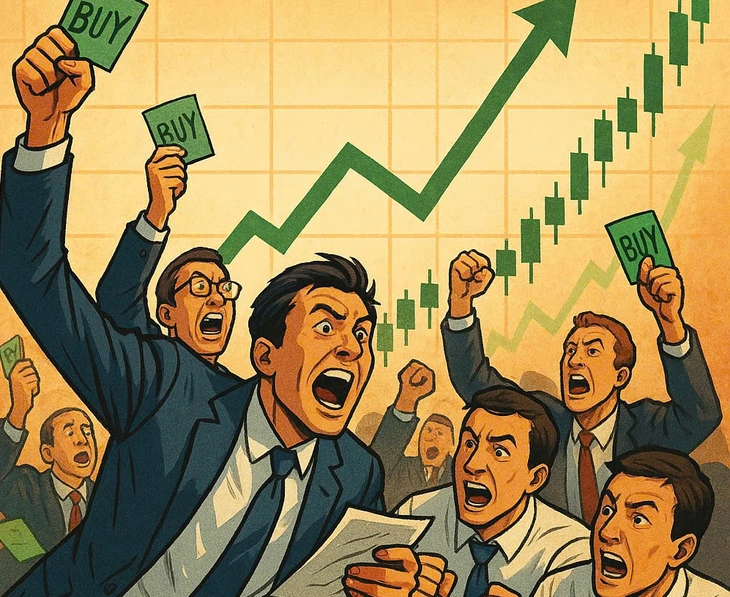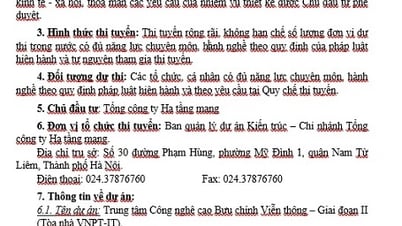
In the current volatile period, individual investors - who account for more than 90% of transactions in the market - need to maintain a cautious mindset - Photo: AI drawing
VN-Index closed the session on April 10 up +6.77%, closing at 1,168.34 points, this is a historical increase in a trading session.
However, the matched liquidity was only 4,627 billion VND, down nearly 85% compared to the previous session when no investor wanted to sell, while the waiting orders to buy were "full".
90 days is unpredictable, don't rush to buy at all costs
Speaking with Tuoi Tre Online, Mr. Nguyen Quoc Tuyen - head of TVI Securities analysis department - commented that the information about tax deferral from the US is a positive factor helping the market bounce back.
According to Mr. Tuyen, in the context of negative macro news, the market often drops across the board regardless of the specific impact on each stock. Even cheaply priced stocks find it difficult to attract valuable cash flow because investors have not yet determined the bottom.
However, when sentiment improves thanks to supportive information, the market tends to recover quickly. "Currently, many stocks have returned to historically low valuation levels, even lower than the COVID-19 period in March 2020," Tuyen assessed.
Meanwhile, Ms. Cao Thi Ngoc Quynh - Director of Institutional Clients at VNDIRECT Securities, noted that investors need to maintain a cautious mindset.
Overreactions such as panic selling when bad news comes out or buying when the market is hot can lead to big risks.
This expert's view is that investors should first average their capital costs and lower their margin to a safe level. Then continue to reduce it to a low level because the next 90 days are very unpredictable.
"Part of the investment should be invested in fixed-income assets to reduce risks. In the long term, we should focus on businesses with good fundamentals and prices that have been heavily discounted during the recent over-selling period," said Ms. Quynh.
Which industry groups should pay attention?
Ms. Quynh said that with the wave of buying by investors and no counter-selling side, the market only maintained a small level of liquidity in yesterday's session.
"In the short term, the market will have positive upcoming sessions as sentiment has been untied from previous sell-offs, but to assess the long-term trend, we need to closely monitor the results of trade negotiations between Vietnam and the US in the next 90 days," Ms. Quynh emphasized.
According to this person, if Vietnam takes advantage of this opportunity to reach agreements to reduce tax rates or diversify export markets, the market could reach the 1,300 point range in the third quarter of 2025.
Conversely, if there is no clear progress or retaliatory actions by countries in the trade war increase, selling pressure could return as investors return to a defensive mentality.
According to Mr. Tuyen, in the following sessions, the market will continue to recover, at least bringing stocks to reasonable valuations.
"Please note that we still have 90 days to negotiate. That means we do not know the specific tax rates for each export industry - not that there will be no tax," Mr. Tuyen emphasized.
Therefore, for industries such as seafood export, wood, stone, textiles, industrial park real estate, Mr. Tuyen said that the prospects are decided by the results of upcoming negotiations.
"Regarding stock selection, we prioritize choosing industries that are less affected by taxes or have low US export proportions," Mr. Tuyen recommended.
Ms. Quynh also advised investors to allocate their portfolios reasonably, avoid "all-in" on a specific industry group or stock, and keep a certain amount of cash to take advantage of the opportunity to "buy the bottom" if the market corrects deeply.
"More importantly, it is necessary to closely monitor information from trade negotiations and support policies from the Government to make timely decisions," Ms. Quynh emphasized.
According to experts, the tax delay is an opportunity for the Vietnamese government and businesses to negotiate to reduce the expected tax rate from 46% to around 10-20% or find ways to balance the trade balance.
At the same time, it also creates a premise for businesses to adjust their strategies and reduce dependence on the US market - which accounts for a large proportion of Vietnam's exports.
Source: https://tuoitre.vn/my-hoan-ap-thue-trong-90-ngay-phan-ung-thai-qua-nao-tren-thi-truong-chung-khoan-cung-phai-tra-gia-20250411080906984.htm






![[Photo] Award ceremony for works on studying and following President Ho Chi Minh](https://vphoto.vietnam.vn/thumb/1200x675/vietnam/resource/IMAGE/2025/5/20/a08ce9374fa544c292cca22d4424e6c0)
![[Photo] Vietnamese shipbuilding with the aspiration to reach out to the ocean](https://vphoto.vietnam.vn/thumb/1200x675/vietnam/resource/IMAGE/2025/5/20/24ecf0ba837b4c2a8b73853b45e40aa7)


















































































![[VIDEO] - Enhancing the value of Quang Nam OCOP products through trade connections](https://vphoto.vietnam.vn/thumb/402x226/vietnam/resource/IMAGE/2025/5/17/5be5b5fff1f14914986fad159097a677)
Comment (0)